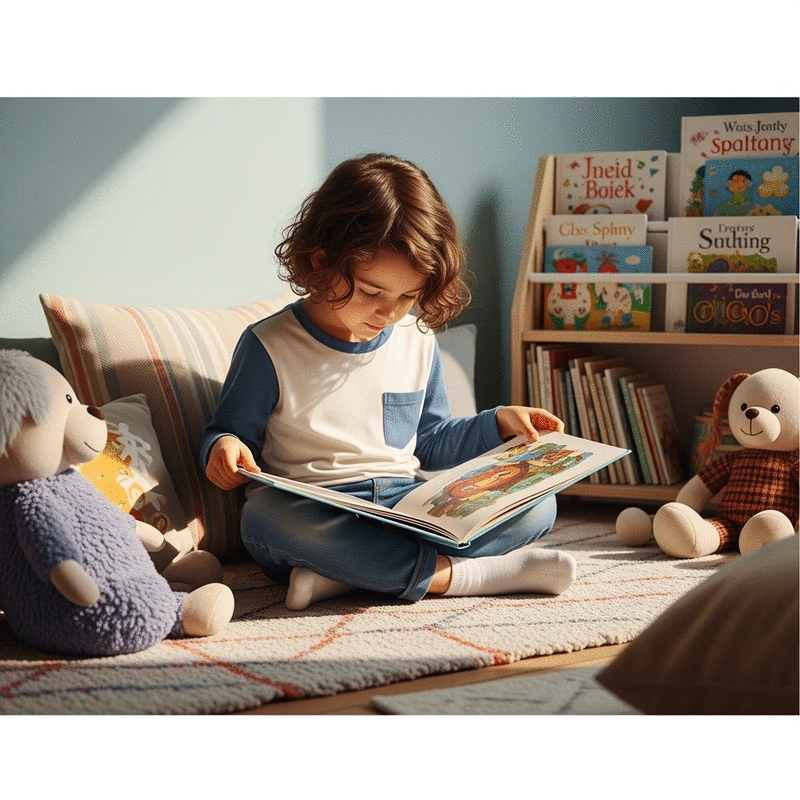Boost Your Child’s Reading Skills

As we delve into the significance of literacy development, consider the lasting impact early reading habits can have on a child's future. By actively engaging with your child, you can transform reading into a cherished adventure that shapes their understanding of the world.
What You Will Learn
- The critical role early literacy skills play in a child's cognitive and emotional development.
- How a literacy-rich home environment encourages a love for reading.
- The importance of parental engagement in reinforcing literacy skills.
- Practical strategies to make reading a daily habit for lifelong learning.
Key Pillars of Early Literacy Development
This visual highlights the essential elements contributing to a child's early literacy journey, emphasizing core concepts and their impact.
Why Early Literacy Matters
- ✓ Cognitive Development
- ✓ Communication Skills
- ✓ Academic Preparedness
Home Environment Influence
- ✓ Rich Reading Materials
- ✓ Shared Storytelling
- ✓ Library Visits
Parent Engagement
- ✓ Read Aloud Together
- ✓ Ask Open-Ended Questions
- ✓ Share Reading Experiences
Empowering Parents
- ✓ Educate Yourself
- ✓ Be Involved
- ✓ Encourage Exploration
Reading as a Daily Habit
- ✓ Morning Talks
- ✓ Bedtime Stories
- ✓ Weekend Sessions
Resources for Exploration
- ✓ Educational Apps
- ✓ Kids Book Clubs
- ✓ Family Reading Nights
Understanding the Importance of Literacy Development at Home
As a parent or educator, you might wonder why early literacy skills are so crucial for your child's development. Nurturing these skills from an early age not only fosters a love of reading but also lays a solid foundation for academic success. Engaging with books and stories helps children develop critical thinking, expand their vocabulary, and improve their comprehension abilities.
The ability to read and write is not just about mastering words; it’s about understanding the world around us. When children learn to interpret stories, they also learn about emotions, cultures, and different perspectives. This understanding is fundamental for their social and emotional growth! In fact, research highlights the significant connection between a child's reading motivation and their overall literacy development, as detailed in this report on research into motivation and literacy.
Why Early Literacy Skills Matter for Your Child
- Promotes cognitive development and problem-solving skills
- Enhances communication abilities
- Encourages creativity through imagination and storytelling
- Prepares them for future academic challenges
Research shows that children who develop strong literacy skills early on are more likely to excel in school. They are equipped to tackle more complex texts and subjects as they progress through their education. By investing time in literacy, you are setting your child up for a brighter future! Furthermore, studies, like those found on PMC NCBI, indicate that early literacy skills significantly predict later academic achievement.
How Home Environment Influences Literacy Growth
The environment in which a child grows plays a significant role in their literacy development. A home filled with books, stories, and opportunities for reading can greatly enhance a child's willingness to learn. By creating a literacy-rich environment, you are inviting your child to explore the joy of reading.
- Surround your child with a variety of reading materials—books, magazines, and even audiobooks.
- Encourage a culture of reading by sharing stories together.
- Make visits to the library a regular part of your routine.
Children are naturally curious, and when they see reading as a valued activity in their home, they are more likely to embrace it. Remember, a supportive atmosphere where books are accessible can spark a lifelong passion for reading! Moreover, engaging in reading for pleasure early in childhood is linked to better cognitive performance and mental well-being, as reported by University of Cambridge research.
The Role of Parent Engagement in Literacy Development
As a parent, your involvement is key to your child's literacy journey. Engaging with your child during reading time not only makes the experience enjoyable, but it also reinforces their learning. Have you ever considered how your enthusiasm for books can inspire your child's love for reading?
- Read aloud together to model fluent reading and pronunciation.
- Ask your child open-ended questions about the story to stimulate thinking.
- Share your own reading experiences to show the joy that books can bring.
By actively participating in your child's literacy development, you are not just teaching them to read; you’re creating cherished memories that will last a lifetime. Together, you can embark on wonderful adventures through the pages of a book!
Pro Tip
Did you know? Engaging in regular discussions about the stories you read together can significantly enhance your child's comprehension skills. After reading a book, ask open-ended questions like, “What was your favorite part?” or “How would you change the ending?” Such conversations not only deepen understanding but also encourage critical thinking and creativity!
Wrapping Up Your Literacy Journey
As we reach the end of our exploration into fostering literacy in children, it's important to reflect on the steps we've covered. Nurturing a love for reading is a lifelong journey, and as parents, we play a crucial role in guiding our children through this adventure. The literacy skills we help develop today can set the stage for a lifetime of learning and curiosity!
Incorporating strategies such as creating a reading-friendly atmosphere and engaging in interactive reading can make a significant difference in your child's development. Together, let's empower ourselves to be the best literacy advocates we can be!
Empowering Parents to Foster Literacy Skills
Being an active participant in your child's reading journey is one of the most impactful things you can do as a parent. It’s not just about reading books together; it's about creating an environment that encourages exploration and imagination. Here are some ways to empower yourself:
- Educate Yourself: Stay informed about literacy development stages and effective reading strategies.
- Be Involved: Attend school events and participate in community reading programs.
- Share Experiences: Connect with other parents and educators to exchange tips and resources.
- Encourage Exploration: Let your child choose books that ignite their interests.
By taking these steps, you're not only enhancing your child's reading skills but also building a supportive community around literacy. At Kids Book Guide, I believe that every child deserves the chance to fall in love with reading!
Making Reading a Daily Habit for Lifelong Learning
Establishing a daily reading routine is essential for transforming reading into a cherished habit. You can start simple! Here are a few ideas to seamlessly integrate reading into your family's daily life:
- Read during meals: Set aside a few minutes for a story at breakfast or dinner.
- Bedtime stories: Make it a ritual to read a chapter or a few pages each night.
- Morning talks: Discuss the book your child is currently reading over breakfast.
- Weekend reading sessions: Dedicate time on weekends to explore new books together.
Consistency is key. By making reading a regular part of your day, you’re not just enhancing literacy skills—you’re fostering a love of learning that will last a lifetime!
Frequently Asked Questions (FAQs)
Here are some common questions about early literacy development:
- Why are early literacy skills important for a child's development?
Early literacy skills are crucial because they promote cognitive development, enhance communication abilities, encourage creativity, and prepare children for future academic challenges. They lay the foundation for a lifelong love of learning and academic success. - How can a home environment influence a child's literacy growth?
A literacy-rich home environment, filled with various reading materials, shared storytelling, and regular library visits, significantly enhances a child's willingness to learn and fosters a lifelong passion for reading. When reading is valued at home, children are more likely to embrace it. - What is the role of parents in fostering literacy skills?
Parental involvement is key. Reading aloud together, asking open-ended questions about stories, and sharing personal reading experiences not only make reading enjoyable but also reinforce learning, stimulate critical thinking, and create lasting memories. - What are practical strategies to make reading a daily habit?
Practical strategies include incorporating reading into daily routines such as reading during meals, making bedtime stories a ritual, discussing books during morning talks, and dedicating time for weekend reading sessions. Consistency is vital for establishing reading as a cherished habit. - What resources can parents use to further explore literacy tools?
Parents can explore educational apps that offer interactive learning experiences, join kids' book clubs to encourage social interaction around reading, and attend family reading nights. These resources can keep the excitement for reading alive and support a child's literacy journey.
Get Started with These Reading Tips Today!
Now that we’ve discussed the importance of cultivating literacy skills, let’s put these ideas into action! Here are some quick tips to kickstart your reading journey:
Encouragement to Try New Strategies and Activities
Embrace the various strategies we’ve talked about, and don’t be afraid to try new ones! Here are some suggestions:
- Start a family reading night where everyone shares their book recommendations.
- Make reading a game—find books related to your child's interests!
- Use puppets or toys to create engaging storytelling sessions.
Remember, every effort counts towards building a strong foundation for your child's literacy!
Resources for Further Exploration of Literacy Tools
There are countless resources available to support your literacy journey. Here are a couple of areas to explore:
Exploring Educational Apps to Enhance Learning
Don't forget the digital world! There are fantastic educational apps that can make learning fun and interactive. These can offer personalized experiences that cater to your child's interests.
Joining Book Clubs for Kids to Encourage Reading
Consider enrolling your child in a book club. These clubs promote social interaction while diving into new stories together, making reading a shared experience. It’s a great way to keep the excitement alive!
By committing to these strategies and utilizing available resources, you’ll be well on your way to enriching your child’s literacy skills and ensuring they carry a love of reading into their future. Happy reading!
Recap of Key Points
Here is a quick recap of the important points discussed in the article:
- Early literacy skills promote cognitive development and enhance communication abilities.
- Creating a literacy-rich home environment encourages a love for reading.
- Parental engagement during reading fosters critical thinking and emotional growth.
- Establishing a daily reading routine helps transform reading into a cherished habit.
- Utilizing educational resources and community activities enriches your child's literacy journey.
Popular Posts
 As you navigate the vibrant world of children's literature, think about how a simple signature can t
As you navigate the vibrant world of children's literature, think about how a simple signature can t
 What if the right book could unlock your child's imagination and build their future? Understanding a
What if the right book could unlock your child's imagination and build their future? Understanding a
 Reading stories isn't just a pastime; it's a powerful catalyst for children's education. Australian
Reading stories isn't just a pastime; it's a powerful catalyst for children's education. Australian
 In the words of Aveline Carter, "The journey of discovering books can be just as exciting as reading
In the words of Aveline Carter, "The journey of discovering books can be just as exciting as reading
